Docx files for personal book: Verbum 9 part 1; Verbum 9 part 2; Verbum 9 part 3; Verbum 9 part 4; Verbum 9 part 5; How to use the Verbum Lectionary and Missal; Verbum 8 tips 1-30; Verbum 8 tips 31-49
Reading lists: Catholic Bible Interpretation
Please be generous with your additional details, corrections, suggestions, and other feedback. This is being built in a .docx file for a PBB which will be shared periodically.
Previous post: Verbum Tip 8g Next post: Verbum Tip 8i
Faithlife assistant: Definition and lookup
If one watches the forums, one notices “search” being used to refer to navigating to a page number, finding a definition, identifying the person in a position, … therefore, I will include them here.
Why provide so much detail on Faithlife Assistant? Because Amazon’s Alexa provides an interface to Faithlife Assistant. See Amazon.com: Faithlife: Alexa Skills to enable/disable skills. (Try: “Alexa ask Faithlife to read Lamentations 1”) Google Assistant also provides an interface. The initial announcement of this interface is from August 12, 2016:[quote]
‘Your Amazon Echo can play music, check the weather, and even order a pizza... but now it can do something much more important: read the Bible. With the Faithlife Skill, your Echo can read Bible verses, daily devotionals, prayers, and more.
http://alexa.amazon.com/spa/index.html#skills/dp/B01J6U1ABM/?ref=skill_dsk_skb_sr_0
Here are some of the things you can ask:
- Read Jeremiah 29 verse 11
- What is today's devotional? - Reads from Morning and Evening
- What is the verse of the day?
If you link your Faithlife account, you can also ask:
- What should I pray for today?
- What are my readings for today? - This uses your preferred Bible, and can also read from most books if you create a custom reading plan in Logos 6
It will even answer some trivia questions, such as: "Who were the apostles?", "What are the fruits of the spirit?", "What is the Lord's prayer?", and "What is the apostles' creed?"
This project was developed during one of our company hackathons and we're excited to release it today! What else would you like to see this skill do for you?”[1]
If you are interested in having voice activated Verbum commands in any environment, I strongly encourage you to use this feature and encourage Faithlife to maintain and expand this feature.
To Faithlife assistant: Amarna letters define
Response: The response is an actual definition from the ISBE; Factbook is opened to the appropriate entry.
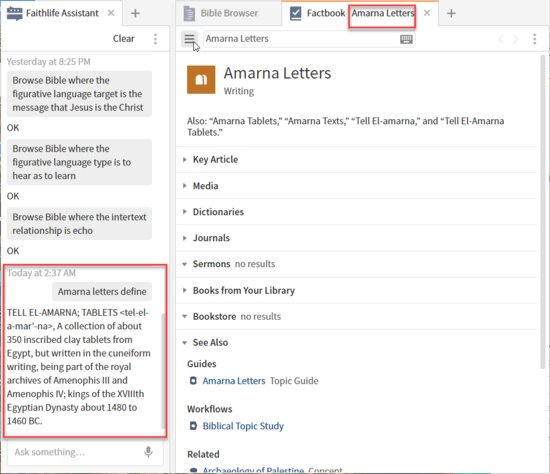
To Faithlife assistant: clothing definition
Response: The response is an actual definition from The New Bible Dictionary; Factbook is opened to the appropriate entry. Note in this screenshot I have included the experimental left panel of Factbook which displays ontologies.
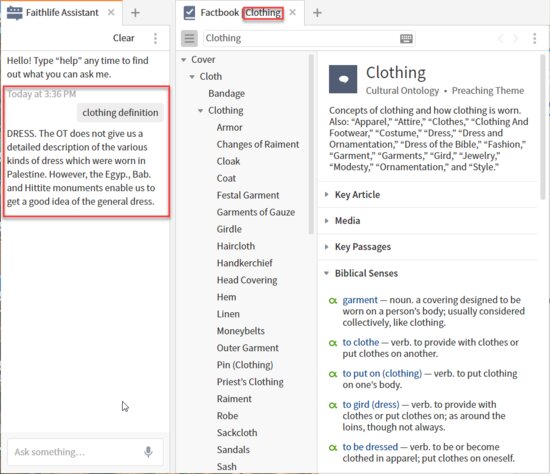
To Faithlife assistant: In Genesis chapter one, what does firmament mean?
Response: The response is an actual definition from Easton’s Bible Dictionary; Factbook is opened to the appropriate entry.
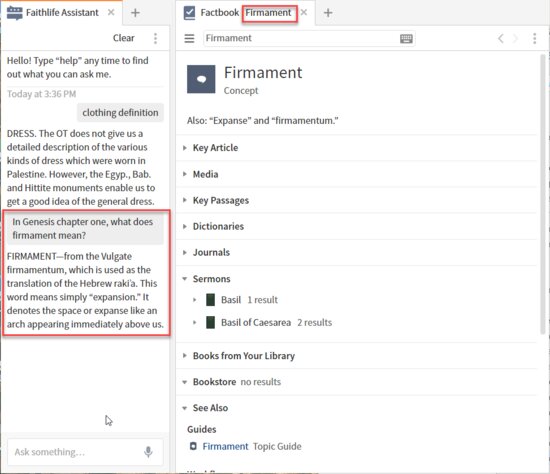
To Faithlife assistant: Meaning of appropriation
Response: The response is an actual definition from The Oxford Dictionary of the Christian Church; Factbook is opened to the appropriate entry.
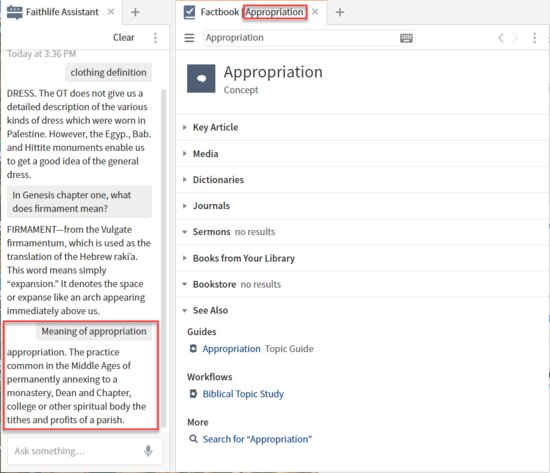
To Faithlife assistant: Tell me about Bethlehem
Response: The response choses Bethlehem (of Zebulun) rather than the better known Bethlehem (of Judea). The spoken response does not acknowledge the ambiguity but the Factbook entry offers a link to Bethlehem (of Judea). The displayed result is an actual definition from Lists of Biblical People, Places, Things, and Events; Factbook is opened to the appropriate entry.
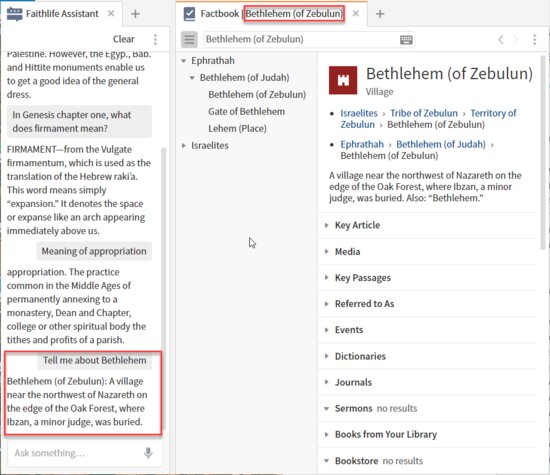
To Faithlife assistant: Tell me about Paul.
Response: The displayed result is an actual definition from Lists of Biblical People, Places, Things, and Events; Factbook is opened to the appropriate entry.
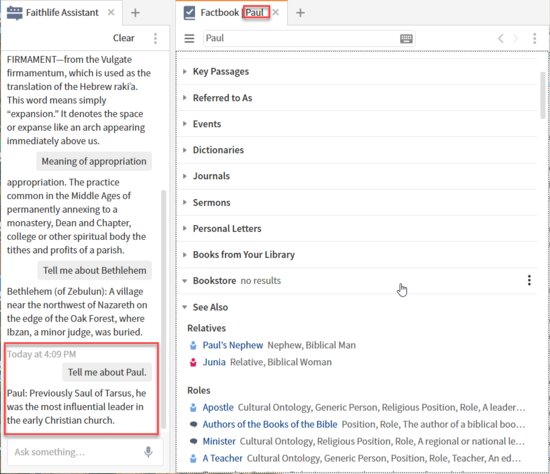
To Faithlife assistant: Where are the Golan heights?
Response: The response is an actual definition from The Anchor Yale Bible Dictionary; Factbook is opened to the appropriate entry.
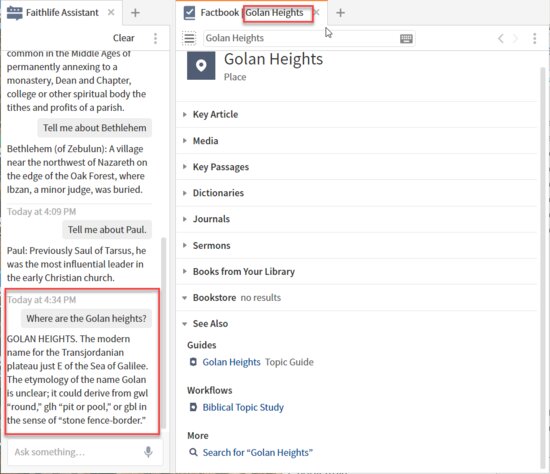
To Faithlife assistant: Who is Jesus?
Response: The displayed result is an actual definition from Lists of Biblical People, Places, Things, and Events; Factbook is opened to the appropriate entry. Sort of – the record should reference all four Jesuses of the Bible rather than Jesus of Nazareth as the heading indicates. This has been reported as a data error. It is encouraging that the “name” record is selected rather than a specific person with the name.
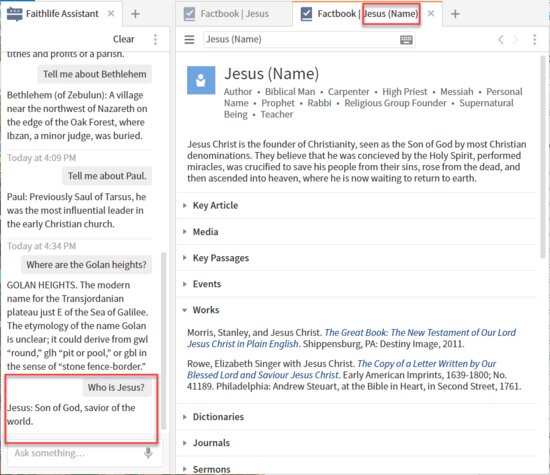
To Faithlife assistant: Who is Pope?
Response: The response is an actual definition from Catechism of the Catholic Church; Factbook is opened to the appropriate entry. I could complain that it should have answered with the Coptic Pope but …
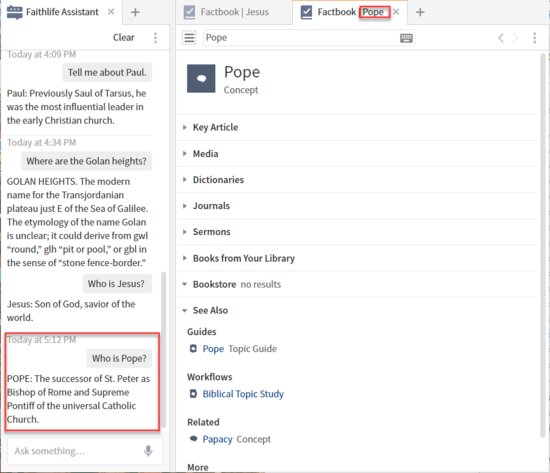
To Faithlife assistant: Greek for “righteousness”
Response: The response is a transliterated “dikaiosynē” with a Bible Word Study on the English word “righteousness”.
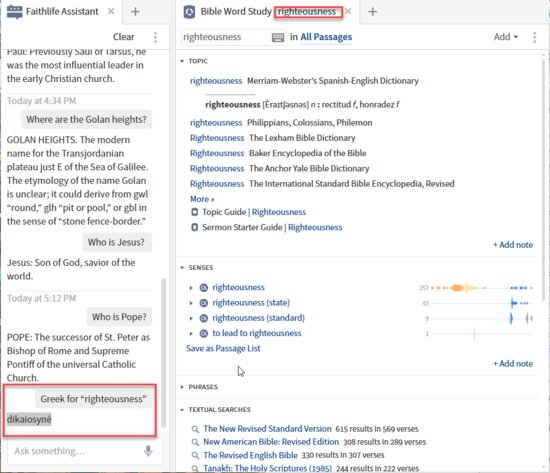
To Faithlife assistant: Greek word for love.
Response: The response is a transliterated “agapaō” with a Bible Word Study on the English word “love”.
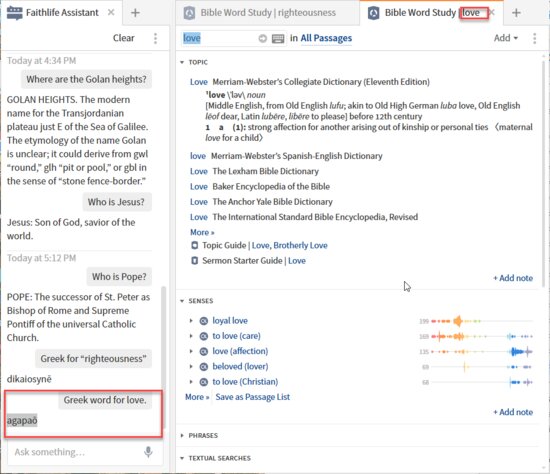
Panel Menu
We have now completed the first branch of the overview mind map that began this tip. The next branch consists of searches and look ups initiated from a resource panel. The first pair are found in the panel menu:
- Find (in this panel)
- Show inline search

Find (in this panel) – a review
The Find function is a simple character by character string match, independent of the parameters that can be set for a search. An illustration of its use using Genesis 12:1 as the example:
Enter “Now the Lord said to Abram” and the beginning of the verse is highlighted showing a match:
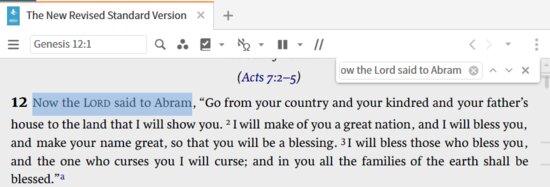
Add a space after Abram and the search argument turns pink indicating that there is no match:

But continuing with the punctuation does retain the match. Note quotes and smart quotes are different characters.
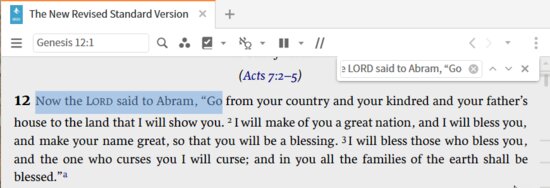
Compare this to a search which in general, ignores punctuation.
[1] New feature: Talk to Faithlife on your Amazon Echo! - Faithlife Forums (logos.com) accessed 4/22/2021 2:11 AM